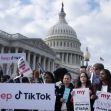Talk among federal and state officials about banning the Chinese-owned app Tik Tok has finally come to fruition as Montana becomes the first state to ban the popular video-sharing app. Governor Greg Gianforte signed Senate Bill 419 into law on Wednesday, making it illegal for residents of the state to download the app.
Gov. Gianforte explained that this legislation was imperative to protect the private information of Montana residents so that such data does not get into the hands of the Chinese government. "The Chinese Communist Party using TikTok to spy on Americans, violate their privacy, and collect their personal, private, and sensitive information is well-documented," Gov. Gianforte said in approving the bill.
The Chinese government has long been accused of using the app as a modern-day social warfare tactic to collect sensitive info on Americans and other cyber intelligence in a way that could later be used against American interests. While there's no direct evidence supporting the claims made against the communist government regime, that hasn't stopped lawmakers from voicing their concerns about China’s ability to spy on the users who download it, especially when it comes to federal officials who have the app downloaded on their personal devices. Currently, the U.S. is one of the “Five Eyes” security partners that have banned the app on federal government devices. The other Five Eyes include Australia, Canada, New Zealand and the United Kingdom.
Under this new bill, residents in Montana will be violating the law if they use the app. However, the bill does not penalize users. Instead, the new bill will target entities that provide the app for download in Montana. Platforms including the Google Play Store, the Apple App Store, and Tik Tok itself will face a $10,000 initial fine and then an additional $10,000 daily fine if they violate the law. The actual users of the app will not face any fines. The ban on Tik Tok will not go into effect until January 1st, 2024. Until then, residents will still be able to download and use the app without violating the law.
Despite this new bill, it's not clear if it will actually survive until 2024. A slew of legal challenges has already arisen, including a number of anticipated lawsuits that will likely end the bill before it can ever be exercised.
Several groups and organizations have already voiced their concerns about the statewide ban on this wildly popular app. Policy director at the ACLU of Montana, Keegan Medrano, explains that the bill is a direct violation of Montanans’ free speech.
The U.S. arm of Tik Tok also released a statement following the bill explaining that the new law is a direct infringement on the First Amendment rights of Montana residents. Their statement adds that it will "continue working to defend the rights of our users inside and outside of Montana."
The app currently has over 150 million American users. Gaining widespread popularity at the start of the pandemic, the app grew to be an unstoppable force that was quickly criticized by federal leaders. In March, Congressional leaders grilled the app's CEO Shou Zi Chew about the platform's use of personal data and whether Chinese government officials had access to the data collected on American users.
Chew Insisted that the Chinese government did not have access to servers that stored data collected on American users and that if the Chinese government ever asked him or his company to provide that data, they would decline.
In addition to questioning its constitutionality, many officials are questioning how the bill could actually be enforced. Questions surrounding jurisdiction have been raised with tech experts pushing back on what would happen if a resident outside of Montana used servers in the state to download the apps or if Montanans could still be in violation of the law if they used a VPN tunnel to download the app.
As more questions and concerns about the legal challenges that lie ahead come forward, it remains certain the success or failure of this law could determine how the government can and cannot regulate tech use in today's globally connected world.






